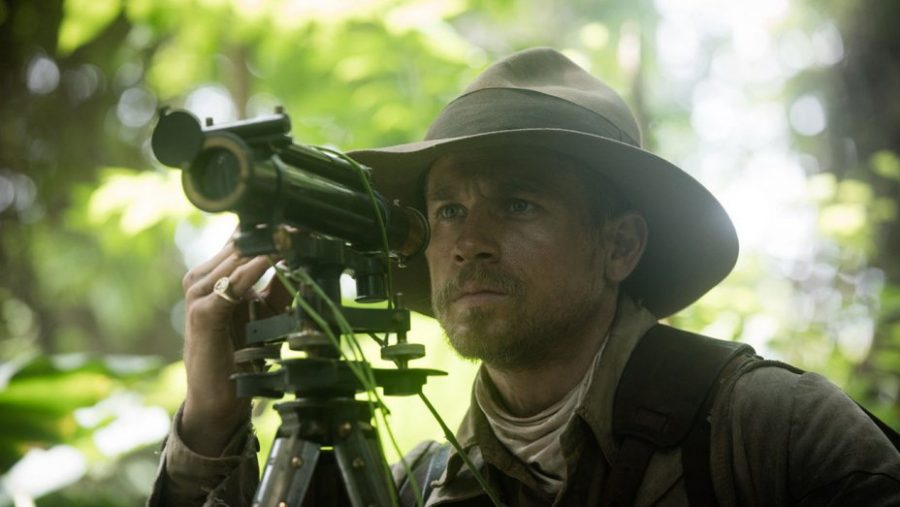In cinemas nationwide now.
There’s a scene in The Lost City of Z in which intrepid explorer Col Percy Fawcett (Charlie Hunnam) and his aide-de-camp Henry Costin (a lush beard with Robert Pattinson hidden beneath) stumble across a makeshift opera house in the middle of the Amazon. Oddly replete with full orchestra and presided over by a Conradian rubber-baron, it’s a dreamy highlight in an otherwise earnest and meandering true-life tale that tries to bury its imperialistic derring-do beneath furrowed-brow spiritualism.
Fawcett is a major overlooked by his social superiors thanks to his, ‘unfortunate choice of ancestors’. The Royal Geographical Society see capability and potential in the young man and send him to settle a land dispute between Bolivia and Brazil. He sees it as a redemptive possibility for his family name, yet when he finds evidence of a civilisation (the titular city, as christened by Fawcett) it becomes his obsession, despite the puffed-up colonial scoffing of the Society and his distancing from his loving wife (Sienna Miller) and children.
There are obvious monolithic presences when making a film of this ilk. Herzog’s incredible pillars of madness Aguirre: The Wrath of God and Fitzcarraldo loom large, as do Coppola’s Apocalypse Now. It’s these that James Gray seeks to stand with, and as Fawcett’s wife wistfully says, quoting Robert Browning’s Andrea del Sarto, ‘A man’s reach should exceed his grasp, Or what’s a heaven for?’ His greatest asset in this quest is cinematographer Darius Khondji (Delicatessen, Midnight in Paris, Amour) who wrings a sense of awe from every frame. He captures the sense of scale of in his landscapes, and the close-up futility of man’s wish to conquer them. Whenever the film threatens to become too ponderous, another jaw-dropping shot will fill the screen.
Sienna Miller also acquits herself superbly in what could be a limited role. It’s a shame however that she’s once again portraying a strong, interesting woman playing second fiddle to a vastly less interesting man, as she did in Live by Night recently.
Gray himself is rather stuck between a rock and a hard place when it comes to his storytelling. Fawcett is a man of decency and progressive views, albeit rather dully portrayed by the somewhat bafflingly popular Hunnam, but was nonetheless a man of his time. In trying to distance himself from old-fashioned depictions of the Amazonian natives, Gray can’t entirely ignore the threat that they pose to the explorers, so standard adventure tropes like spears being hurled by painted warriors are wheeled out in an almost embarrassed fashion. These are then swiftly followed by almost condescending scenes of their civilisation. The result is a muddled compromise.
The Lost City of Z is not a failure by any means, but it rather falls between two stools. It seeks to distance itself from the popcorn fun and suspect attitudes of the like of Indiana Jones but doesn’t reach the spiritual heights of Herzog. Apart from brief flashes, there just isn’t the ecstatic lunacy that the Bavarian master brings to his tales of obsession; and Hunnam is certainly no Klaus Kinski. It’s a rather workaday tale lifted by inspired visuals.
